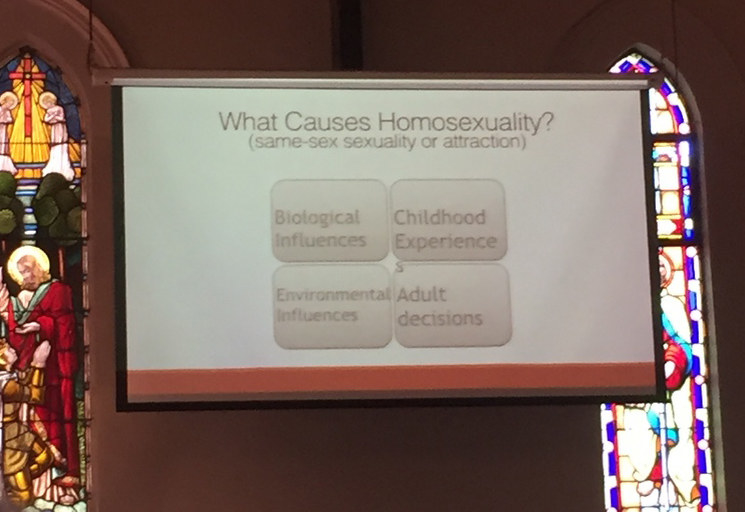Considering how a person becomes gay can be compared to taking several different routes while travelling across Australia, a prominent Christian psychologist told a group of Australian pastors on Wednesday.

Mark Yarhouse, professor of psychology at Regent University in Virginia, USA, spoke at Annandale Village Church in Sydney at the "Sexuality, Gender and Identity in Christ" conference.
The conference was organised by Liberty Christian Ministries, a group previously associated with gay conversion therapy, that now bills itself as an organisation providing "support, hope and education" to Christians who are same-sex attracted.
Most of the conference focussed on a dilemma facing Christian churches today: how do you love and accept homosexual people while fundamentally believing their sexual desires are sinful?
Showing a map of Australia with these four boxes overlaid on top, Yarhouse explained that people's paths to same-sex attraction can be likened to travelling from Western Australia to the east coast.

"I do this with the United States, I hope it works here," he said. "I am assuming there’s multiple ways [to get from one side of the country to the other] … now this might not be the case," Yarhouse said.
There's actually just the one road. But anyway, onwards:
"At the end point, there are multiple ways to be on the eastern side of Australia," Yarhouse continued.

"You can be in Sydney, you can be in other cities and towns along the seaboard. There’s many ways to arrive at the endpoint."
In other words, there aren't only multiple ways to *become* gay, but there are multiple ways to *be* gay once you get there.
Yarhouse also addressed each "cause" of homosexuality pictured in the map, saying he does not think being gay is a choice.

Yarhouse said nature *and* nurture is a better way of thinking about sexuality than nature vs. nurture.
"There’s multiple pathways that would be weighted differently. I think for some people there is greater weight on nature, but I wouldn’t say it’s like eye colour. It’s more like ... in a room this size, we have people who have a lower threshold before they get depression or anxiety."
Yarhouse also offered "being outgoing" as a positive example of something that can be influenced by nature and nurture.
"Nature can provide a push, and other environmental influences can also provide a push."
Of the four categories, Yarhouse spent the least amount of time on biology. There can be biological influences and Christians have "nothing to fear" from this, he said.

Moving to the childhood experience box, Yarhouse said the two most common hypotheses among conservative Christians as to what could make a person gay are childhood sexual abuse and negative parental relationships.

Yarhouse said neither hypothesis was proven, saying studies on negative relationships with parents are often poorly designed and outdated, but he has clinically met with many people who report this.
"When you survey adults who are gay and lesbian about their childhood, they are more likely to report childhood sexual abuse ... but it’s a different question to say does that cause a sexual orientation," he said.
Environmental influences could include prenatal conditions, or even where you are born.

"There's been some interesting prevalence research into rates of homosexuality in urban versus suburban versus rural setting, with a higher prevalence in urban areas," he said.
"Some of that's people moving to urban setting, but it's also been seen in adolescents who aren't migrating."
Yarhouse was careful to say that he does not believe people choose to be same-sex attracted, but emphasised adults are still able to make decisions around behaviour and identity.

"When you’re on a path, you make decisions that reinforce that path," Yarhouse said.
"There is something to be said, as I shared gently and pastorally with [a same-sex attracted] 18-year-old, you do have choices to make."
